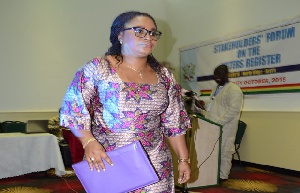 Charlotte Osei, Chairperson for the Electoral Commission
Charlotte Osei, Chairperson for the Electoral Commission
Ghana has been challenged by Nigeria’s former Electoral Commission head, Prof Attahiru Jega, to beat Africa’s most populous democracy, as far as the conduct of free, fair, and transparent elections are concerned.
Prof Jega said at a lecture series at the College of Physicians and Surgeons in Accra to commemorate the 25th anniversary of the Institute of Economic Affairs (IEA) that: “In spite of many challenges, Nigeria’s 2015 elections were very successful and showed remarkable level of credibility over the 2011 elections, yet it was not perfect.”
“There’s tremendous room for improvement and also there is a lot that could be learned, as I have indicated, by other countries in Africa, as they seek to improve their electoral processes.
“I want to say that as all eyes were on Nigeria in 2015, so all eyes will be on Ghana in 2016 as you prepare and subsequently conduct your elections. And as I mentioned earlier, about soccer, I think that if you have been beating us in soccer, you must now beat us in the conduct of free, fair, and credible elections,” Prof Jega challenged Africa’s second-largest cocoa producer which heads to the polls in November next year.
Prof Jega also said at the lecture that many of the international media houses that thronged Nigeria to cover the country’s 2015 general elections on March 28 were there to cover anticipated electoral violence and not the election itself.
He told the audience on Monday December 14, 2015, that the ‘do or die’ manner in which the political elite in Nigeria went about the election built anticipation for violence, thus the crave of the international media for violence during the polls.
“And obviously, many international media that came to witness the 2015 general elections evidently came not to observe the elections, but to cover the anticipated crisis that was going to happen after the elections.
“And I’m saying this in all seriousness because some of them came after the elections and confessed this to us that we are actually here not to cover good elections because we expected that there was going to be crisis in Nigeria,” Prof Jega said, adding: “I’m very glad that most of those prognoses did not come true and rather than that we have been able to begin to get out of the cycle of badly conducted elections in Nigeria.”